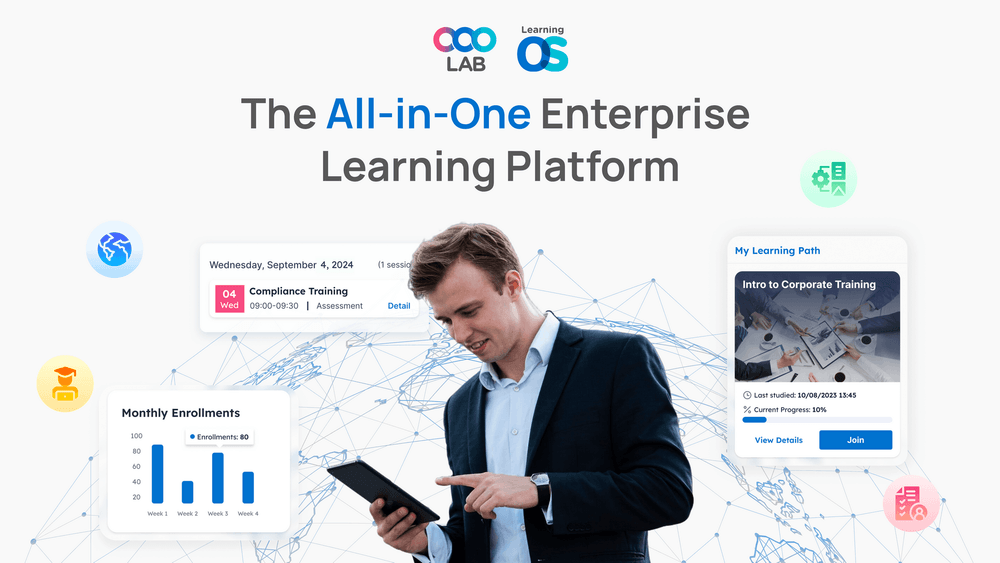

Effective sales training is a cornerstone of high-performing teams, equipping reps with skills to close deals, build relationships, and drive revenue. Yet, many organizations stumble in their approach, leading to wasted resources, low engagement, and stagnant growth. Avoiding common pitfalls can transform sales training from a checkbox exercise into a strategic advantage.
This blog uncovers the most frequent sales training mistakes and how to sidestep them, drawing on insights from industry experts. By addressing these errors, leaders can foster motivated teams that deliver consistent results. Whether you're revamping existing programs or starting fresh, these lessons will help refine your sales training strategy for maximum impact.

Sales training empowers reps to navigate complex buyer journeys, handle objections, and align with organizational goals. When done well, it drives measurable outcomes: a 2024 Salesforce report found that companies with robust training programs see 31% higher win rates. However, mistakes in sales training can lead to disengagement, skill gaps, and lost opportunities.
Avoiding these errors ensures sales training delivers value, fostering confident, capable teams. An enterprise LMS can streamline this process, providing analytics and scalability to optimize training efforts.
>>> Read more: Sales Training Demystified: Why It Matters More Than Ever
>>> Read more: Effective Onboarding Strategies for New Sales Hires: Setting Them Up for Success
Missteps in sales training can undermine even the best intentions. Below are the most common mistakes organizations make and their consequences.
Without defined goals, sales training becomes a scattershot effort, wasting time and resources. Training that doesn’t align with business priorities—like increasing deal size or reducing churn—fails to deliver impact. A 2023 McKinsey study found that 62% of training programs lack clear objectives, leading to 34% lower ROI.
Unfocused training confuses reps, reducing engagement and effectiveness. Clear goals tied to measurable outcomes are essential for success.
Treating all reps the same ignores their unique roles, experience levels, and skill gaps. For example, junior reps need foundational sales training, while veterans require advanced strategies. Generic programs lead to disengagement, as reps find content irrelevant.
A 2024 LinkedIn Learning report noted that personalized training boosts completion rates by 38%. Tailoring content ensures relevance, keeping reps motivated and improving outcomes.
Bombarding reps with lengthy, dense sales training sessions leads to cognitive overload and poor retention. Complex manuals or marathon workshops overwhelm learners, reducing knowledge absorption. A 2025 Deloitte study found that information overload decreases skill retention by 22%.
Overloading also frustrates busy reps, lowering morale and participation. Concise, focused training is key to effective learning.
Sales training that focuses solely on theory—without role-playing or real-world scenarios—fails to prepare reps for actual sales situations. Without practice, reps struggle to apply skills, leading to missed opportunities and reduced confidence.
Practical exercises, like simulations, bridge the gap between theory and action, ensuring reps are ready for client interactions.
Treating sales training as a one-time event leaves reps unprepared for evolving markets, products, or buyer behaviors. Skills become outdated without continuous development, impacting performance. Data shows that ongoing training improves sales performance by 15% annually.
Static training programs fail to address new challenges, leaving teams stagnant and less competitive.
Dry, lecture-based sales training bores reps, leading to low participation. Without interactive elements, like gamification or discussions, reps disengage, reducing learning effectiveness. Boring training also dampens morale, as reps feel undervalued or uninspired, further hurting performance.
Without tracking outcomes, organizations can’t assess whether sales training delivers value. Lack of metrics—like completion rates or revenue impact—makes it impossible to justify investments or identify weaknesses. Unmeasured programs risk becoming cost sinks with little return. Analytics are critical to proving ROI and refining sales training for better results.
Book Free Demo with us. Bring your Training and Learning to a new height with LearningOS.

>>> Read more: Building Confidence in Your Sales Team Through Training and Development
>>> Read more: Addressing declining retail foot traffic issue
By addressing these pitfalls, organizations can create impactful sales training programs. Below are strategies, leveraging an enterprise LMS, to ensure success.
Define clear objectives for sales training, such as improving close rates by 10% or reducing onboarding time. Align these with business priorities, like targeting new markets. An enterprise LMS tracks progress toward these goals, providing analytics to measure success. Clear objectives keep training focused, ensuring reps see its relevance and value.
Use an enterprise LMS to deliver tailored sales training based on rep roles, experience, and performance data. For instance, new hires might focus on product knowledge, while seasoned reps train on strategic selling. Personalization ensures content resonates, boosting engagement and effectiveness. An LMS with AI capabilities can analyze skill gaps and recommend customized modules, maximizing impact.
Break sales training into short, 5- to 10-minute modules to avoid overload. An enterprise LMS hosts microlearning content, like videos on objection handling or quizzes on pricing strategies, accessible on demand. This approach fits busy schedules and improves retention. Microlearning keeps reps engaged, delivering knowledge in digestible bursts.
Include practical exercises in sales training, such as role-playing client negotiations or handling objections. An enterprise LMS can host simulations, allowing reps to practice in a safe environment with real-time feedback. These exercises build confidence and ensure skills are actionable. Simulations prepare reps for real-world scenarios, bridging theory and practice.
Design sales training as an ongoing process, with regular updates to address new products, markets, or techniques. An enterprise LMS supports continuous learning through fresh content and reminders, keeping reps sharp. For example, monthly modules on industry trends ensure relevance. Ongoing training fosters adaptability, maintaining competitive edge.
Incorporate gamification—points, badges, leaderboards—into sales training to boost engagement. An enterprise LMS can host competitive challenges, like virtual pitch contests, motivating reps to participate. Interactive forums also encourage knowledge sharing among teams. Engaging training enhances morale, making learning a positive experience.
Use an enterprise LMS to track sales training metrics, such as completion rates, quiz scores, and sales performance. Compare pre- and post-training data to calculate ROI, like a 15% increase in close rates. Analytics identify weaknesses, allowing trainers to refine content. Data-driven insights ensure sales training delivers measurable value.
>>> Read more: A guide to teaching sales rep positive response
>>> Read more: Why is employee upskilling non-negotiable for business success
Avoiding common sales training mistakes is critical for building high-performing sales teams. By setting clear goals, personalizing content, and leveraging an enterprise LMS, organizations can create engaging, effective programs that deliver results. From microlearning to analytics, these strategies address pitfalls and maximize ROI.
Invest in smart sales training today to empower your sales team. With the right approach, you’ll boost morale, performance, and revenue, setting your organization up for long-term success.
At OOOLAB (pronounced 'uːlæb'), our mission is to make complex learning operations simple. We aim to positively impact the lives of over 1,000,000 learners and educators by the end of 2026.
OOOLAB's LearningOS provides educational institutions and corporate enterprises with an all-in-one solution to create and deliver engaging learning experiences.
We meet organizations' needs or support your growth. We provide undivided attention. We provide:
1. Dedicated success manager: We offer direct communication with a real human who'll discuss your enterprises unique learning operations and goals.
2. Personalized setup: Our team will help you transition to LearningOS on your schedule, one step at a time.
3. Around the clock support: Get help from us any time, and in any time zone.
We have recently launched a new AI training tool, Skill Quotient OS, designed to elevate hybrid training to new heights. It offers role-play exercises with scenarios and assessments.This tool can apply in sales training, corporate development and customer support training in any industry.
Reach out to us at: LinkedIn, Facebook, Instagram, Tiktok, X
1. What are the main benefits of LearningOS?
LearningOS streamlines enterprise training by automating onboarding, compliance tracking, and performance analytics, encouraging sales teams to focus on revenue-driving activities. It boosts engagement with mobile-accessible modules and gamified rewards, leading to faster skill acquisition in corporate environments.
2. What main features does LearningOS offer?
Our all-in-one platform integrates a Content Management System for easy course creation, a robust Learning Management System for sales training delivery, advanced authoring tools like H5P for interactive content, and a mobile-friendly Learner Portal for on-the-go access.
3. Can your platform be used for corporate enterprises?
Absolutely! LearningOS is an Enterprise LMS that is a great fit for corporate learning. In fact, we have clients with up to 700,000 employees using LearningOS! Upskill your workforce by creating and assigning interactive eLearning content while effortlessly tracking employee progress.
4. Who currently uses your platform?
LearningOS is a trusted enterprise LMS adopted by a diverse range of global organizations, empowering over 3,000 instructors and 250,000 learners across 23 countries.
5. What types of content options are available on your platform?
You can access ready-to-use curriculums for sales training, including modules on consultative selling and CRM mastery, tailored to your enterprise needs. Additionally, you can request custom courses designed specifically for your teams, such as compliance training for financial staff or product demo modules for sales reps, ensuring content aligns perfectly with your business goals.
6. What is unique about LearningOS?
You’ll experience an enterprise LMS that seamlessly blends interactive courses, gamified learning, and personalized training paths to engage your learners and accelerate skill growth. With Skill Quotient AI, you can leverage advanced algorithms to streamline course creation, automating content design to save you time and deliver tailored, high-impact training. This empowers you to rapidly deploy relevant content, fostering a dynamic, future-ready workforce across your global operations.
7. How can I get started?
You can begin by scheduling a free consultation to assess your enterprise’s sales training needs. During the demo, you’ll explore personalized features like CRM-integrated pathways and analytics dashboards, followed by a quick setup tailored to your organization’s scale, ensuring you’re ready to transform your workforce efficiently.